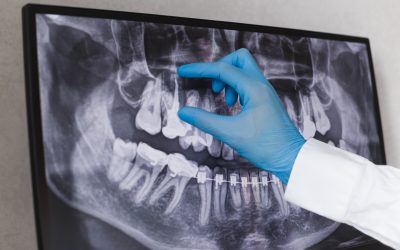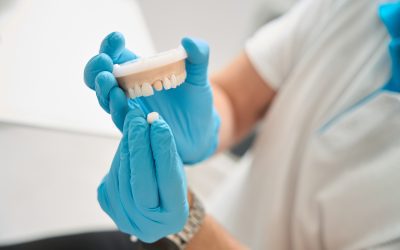Visiting the dentist can be a fearsome experience for many, often stemming from a negative past experience or general anxiety about medical procedures. You may find yourself questioning should you be scared of the dentist and are your fears valid or simply an overreaction.
In this article, we'll explore the reasons behind dental anxiety, discuss steps you can take to face it, and provide helpful tips to make your next dentist appointment less intimidating.
The Origins of Dental Fear and Anxiety
First, it's important to understand that your fear of the dentist is not uncommon and does differ from dental phobia, which is extreme fear and is less common. In fact, many individuals (about 36% of people) experience some degree of anxiety when it comes to dental appointments. The key is to recognize that these feelings are normal and can be managed effectively with proper coping strategies.
Causes of Dental Anxiety
Dental fear and anxiety can stem from a variety of factors. One possible cause is the fear of pain, as many people associate dental procedures with discomfort. Additionally, some individuals might experience anxiety due to the sensation of gagging or choking when their mouths are numbed during treatment. Lastly, negative feelings towards a dentist can contribute to dental anxiety, especially if a person has had a previously bad experience with a dentist.
Past Negative Experiences
When you've had a negative experience with a dentist, it's natural to develop a sense of fear or anxiety about future appointments. The memory of pain or discomfort during previous treatments can make you hesitant to return for necessary care. As a result, your dental anxiety can lead to avoidance, which may exacerbate oral health problems in the long run.

Stories and Media Portrayals
Unfortunately, media portrayals of dentists and dental procedures often perpetuate dental anxiety. Television shows, movies, and even news stories can depict dental visits as painful and intimidating experiences. Hearing stories from friends or family about their dental experiences can further reinforce your fears. Consequently, this creates an exaggerated perception of dental visits and fosters a sense of dental anxiety or phobia.
Remember, it's essential to recognize the origins of your dental fears and work towards overcoming them. A good relationship with your dentist and proper communication can help alleviate dental anxiety, enabling you to benefit from regular checkups and maintain optimal oral health.
Understanding Dental Procedures and Pain Management
Common Dental Procedures
Maintaining your oral health is essential for overall well-being. Thus, visiting your dentist for checkups and necessary treatments regularly is vital.
Some standard dental procedures include:
-
- Teeth cleaning: Removes plaque and tartar buildup, ensuring healthy gums.
- Fillings: To treat cavities and restore the tooth's structure.
- Root canal treatments: In case of infected or damaged tooth nerves, the dentist cleans and seals the tooth's inner chamber.
- Tooth extractions: Removal of a tooth when it is severely damaged or cannot be repaired.
- Dental crowns: Caps to cover a damaged or weak tooth, restoring its strength and appearance.
Pain Relief Options
Dentists aim to ensure your comfort during dental procedures. Many pain relief options are available to help minimize discomfort:
-
- Local anesthetics: Numbing agents are applied directly to the treatment area.
- Over-the-counter pain relievers: most common are ibuprofen, acetaminophen, or aspirin, which are used to alleviate post-treatment discomfort.
- Prescription pain relievers: For more intense pain management after certain procedures.

Anesthesia and Sedation
Some dental patients experience heightened anxiety or pain sensitivity. In such cases, your dentist may recommend anesthesia or sedation to alleviate discomfort and ensure a more pleasant experience:
-
- Nitrous oxide (laughing gas): Provides mild conscious sedation; you remain awake but feel more relaxed.
- Oral sedation: Administered as a pill or liquid, it helps you feel calm and drowsy.
- IV sedation: Intravenous medication that induces a deeper level of relaxation but still keeps you conscious.
- General anesthesia: Reserved for more complex procedures or extreme anxiety; renders you entirely unconscious for the duration of the procedure.
Discussing your concerns and preferences with your dentist, who will help you determine the most appropriate anesthesia or sedation option for your upcoming dental appointment, is crucial. Regularly visiting your dentist and understanding the procedures involved can help alleviate any fear or anxiety. With appropriate pain management options, there is no need to be scared of the dentist.
Overcoming Dental Fear
Preparing for Your Dental Appointment
To ease your dental anxiety, start by choosing a kind, caring, and gentle dentist, and schedule the appointment at a time when you're less stressed. Prepare by gathering all necessary paperwork and insurance details beforehand. Familiarize yourself with the office's location and plan your route to avoid any undue stress. If possible, visit the office beforehand to become acquainted with the layout. At home, practice relaxation techniques such as deep breathing, meditation, and muscle relaxation to reduce your anxiety.
Communication with Your Dentist
Communication is key in easing your dental fear. Be honest and straightforward with your dentist about your dental anxiety, and communicate any concerns you have regarding the appointment. This openness will allow your dentist to adapt their approach and alleviate any unnecessary stress. Discuss your preferred method of communication during the procedure, such as using hand signals if you need a break. Communicating this with your dentist, if you had a lousy experience in the past, can help them understand your dental history and then help them devise a more accommodating treatment plan.
Relaxation Techniques
During your appointment, employ a variety of relaxation techniques to help you feel more comfortable. Try the following methods:
-
- Deep breathing: Focus on your breath as you inhale deeply into your abdomen, then slowly exhale. Focusing on your breath can help calm your mind and relax your body.
- Meditation: Clear your mind, and concentrate on a positive thought or image to minimize anxiety and fear.
- Muscle relaxation: Relieve tension and stress by tensing and releasing different muscle groups.
- Guided imagery: Envision a peaceful situation or location to distract you from the dental procedure.
- Distraction: Bring headphones and listen to calming music, a podcast, or an audiobook during your appointment.
Remember, following the above steps can significantly reduce your dental anxiety and make your visit to the dentist a more positive experience.
Coping with Specific Triggers
Fear of Needles and Drills
If you fear needles or dental drills, know that you're not alone. Try discussing your apprehension with your dentist, as they can employ various techniques to make the procedure less daunting. Some dentists might use a numbing gel before administering the injection, while others could use exposure therapy to help you conquer the uneasiness. Additionally, focusing on your breathing and practicing relaxation techniques during dental procedures may alleviate your anxiety.
Discomfort Due to Noise and Smells
Loud noises and unpleasant smells might make your dental visit uncomfortable. To alleviate the impact of these triggers, try bringing headphones to block out the noise or earplugs designed explicitly for dental visits. You could also consider using a scented mask or a nasal strip infused with a soothing aroma to lessen the impact of unpleasant odors during your appointment.
Managing Gag Reflex and Choking
Fear of gagging or choking during dental procedures is a common concern. To manage this, communicate with your dentist and establish a signal to indicate when you need a break. Additionally, practice controlled breathing through your nose, as it can help suppress the gag reflex. You might also want to try different dental chair positions to find your most comfortable posture.
Overcoming Embarrassment and Shame
If you experience embarrassment or shame due to the state of your teeth, remember that dentists are professionals who deal with various dental situations daily. They're not there to judge you but help improve your oral health. An open dialogue with your dentist about your concerns and understanding that such emotions are not uncommon can help alleviate your distress. Moreover, remind yourself that addressing your dental issues is a positive step toward better health and confidence.
Acknowledging and addressing your specific triggers is essential in overcoming dental anxiety. By facing these challenges head-on, you can significantly improve your experience at the dentist's office and ensure your oral health is appropriately maintained.

Oral Hygiene and Preventing Dental Problems
Daily Oral Care Routine
Maintaining a good daily oral care routine is necessary for keeping your teeth and gums healthy.
Here are some steps you should follow:
-
- Brush twice daily using fluoride toothpaste and a soft-bristled toothbrush. Move your toothbrush gently in a circular motion at a 45-degree angle toward your gums.
- Flossing removes any food particles and plaque between your teeth and should be done daily.
- Rinsing your mouth with an antimicrobial mouthwash helps prevent gum disease and bad breath.
- Change your toothbrush every three months or when the bristles become frayed.
Importance of Regular Dental Checkups
Regular checkups with your general dentist play a crucial role in preventing various dental problems, such as cavities, gum disease, and infections. It's essential to visit your dentist twice a year, every six months, for:
-
- A thorough teeth cleaning to remove plaque and tartar buildup.
- A dental examination to identify any potential issues, such as cavities, gum disease, or broken teeth.
- X-rays, taken every 6 to 18 months, can help spot problem areas before they become severe.
By attending regular checkups and consultations, you reduce the chances of developing serious dental concerns, making your visits less anxiety-inducing.
Healthy Diet and Lifestyle
Your diet and lifestyle play a significant role in maintaining your oral health. Here are some lifestyle habits that can help keep your smile healthy:
-
- Limit your sugar intake, especially from soda, candy, and processed foods, as excessive sugar can lead to cavities.
- Avoid smoking, which is known to cause gum disease and increase your risk of oral infections.
- Limit alcohol consumption as it can contribute to tooth decay and gum problems.
- Drinking water regularly helps to wash away food debris and bacteria from your mouth.
- Add calcium-rich foods like dairy products, leafy greens, and nuts to strengthen your teeth and gums.
By adopting a healthy diet and lifestyle, you'll be able to reduce the risk of dental issues and the need for invasive dental treatments, ultimately making your visits to the dentist more pleasant and worry-free.

Dentistry for Children
Teaching Oral Hygiene Habits
Instilling good oral hygiene habits in your children is essential for their overall health. Begin practicing oral care routines early to help your child develop proper dental habits. Some suggestions for teaching oral hygiene are:
- Start brushing your child's teeth as soon as their first tooth emerges.
- Teach proper brushing techniques, like gently brushing in circular motions and reaching different angles.
- Schedule regular dental checkups to ensure the health of your child's teeth and to detect any potential issues.
How to Help Children Overcome Dental Fear
It's not uncommon for children to experience dental fears. However, there are approaches you can consider to help your child feel more comfortable about visiting the dentist. Here are some tips to ease their anxiety:
- Engage in age-appropriate conversations about what the dentist does and why it's essential for their oral health.
- Let the dentist know about your child's anxiety so they can adjust their approach during the appointment. Open communication with your dental provider is crucial for helping your child feel less anxious during their visit.
- Encourage positive associations with the dentist by using stories or games that involve dental visits.
- Consider finding a specialized dentist who has training in dealing with anxious patients.
Through consistent oral hygiene practices and guidance, you'll be able to help your child maintain good dental health and overcome any dental fears they may have. Remember, early intervention and open communication will ensure your child's comfort when attending dental appointments.
Take Away on Should You Be Scared of the Dentist
In summary, it's normal to have dental anxiety. Working to understand your anxiety's origin is the first step. Then, discuss your concerns with your dental professional using an open and honest dialogue. Following that with a better understanding of your dental needs, procedures, and pain management options can help alleviate your anxiety. You can also employ coping mechanisms when struggling to overcome your dental anxiety.
We've covered ways to mitigate your fears and learn how to approach dental appointments confidently. Remember, maintaining proper oral health is crucial for your overall well-being, so addressing your dental anxiety is a step forward to a happier, healthier you.




